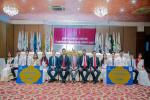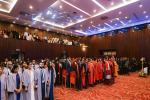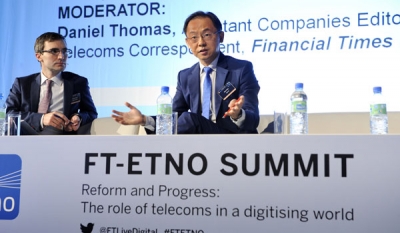A single global standard is vital."
Ding noted that developing a common standard for 5G will require open cooperation between all regions and countries, including Europe, Asia, and the Americas.
In terms of technology, we should avoid multiple standards or standards lagging behind deployment.
In terms of spectrum, we need global agreement on which spectrum is easily available.
This way, we can cut costs and enable seamless interconnectivity around the world.
During the panel session "Industry interview: Lessons in innovation, across continents and into technology", Ding explained that there have been three waves of industry digitalization.
In the first wave, Internet companies like Google and Amazon were the leaders.
The second wave is sweeping traditional service industries such as telecom and financial services.
The third wave is just starting in the real economy, in industries such as automobiles, manufacturing, and power grids.
The next decade will be a decade of digitalization of traditional industries.
During this process, industries will play a key role and connectivity will be the cornerstone.
Europe has many leading global companies in telecoms, finance, manufacturing, and automobiles, where the second and third waves of the digital revolution are taking place.
These companies will be the leaders of industry digitalization. And Europe has the opportunity to lead this trend.
Ding added that a digital industry has three defining characteristics: all things are connected, all things are able to sense, and all things are intelligent.
From connections between people to connections between things, 5G will be a key technology.
Many regions and countries – such as the EU, China, the US, Japan, and South Korea – are pushing for 5G development.
The EU, for example, released the 5G Action Plan on September 14.
A single, global 5G standard is vital to reducing the cost of connectivity and bringing forward 5G deployment.
There were three standards for 3G, and it took ten years for 3G technology to finally commercially deployed.
There were two competing standards for 4G, and real deployment took just five years.
Europe played a leading role in bringing about uniformity in the standards for 3G and 4G.
We believe that Europe will also play a positive role in bringing about a single global standard for 5G.
According to Ding, as industries are going digital, governments should become more open; they should set policies to promote cross-regional and cross-industry collaboration, and push for uniform standards.
This can drive down the cost of industry digitization and accelerate innovation.
The EU is bringing an open approach to the next generation of global communications standards and industry digitalization standards.
The EU-led 5G Private-Public Partnership (5G PPP) includes members from both Europe and other parts of the world, such as Huawei, NEC, NTT DOCOMO, Samsung, and IBM.
And more companies from outside China are now involved in China's 5G and other related programs.
For example, the members of the IMT 2020 5G Promotion Group include not only the Chinese company but also companies like Nokia, Ericsson, Samsung, NTT DOCOMO and Qualcomm etc.
In August 2016, Huawei, Ericsson, and Nokia were jointly awarded the contracts for three key research projects in wireless technology funded by the Chinese government; and Ericsson and Nokia are now members of seven of China's 5G programs.
Many other European companies like Siemens, SAP, Bosch, Volkswagen, Audi, and BMW are also playing a role in China's smart manufacturing and connected car projects.
Europe is Huawei's most important global center of expertise.
We have more than 10,000 employees in Europe, of whom over 76% were hired in Europe.
To support industry digitization, Huawei will increase its investment in supporting European developers, so that ICT SMEs and individual developers in Europe can play a role in industry digitization and innovation.
Huawei plans to invest more than EUR75 million by 2020 in supporting European developers.
As part of the plan, Huawei will establish three Open Labs in the UK, Germany, and Italy to offer support to 50,000 to 100,000 developers.
In addition, with Huawei's global digital marketing platform, developers can reach out to the world market as soon as they enter into a contract with Huawei.
This will help Europe's innovative, digital enterprises expand into the global market.
About Huawei
Huawei is a leading global information and communications technology (ICT) solutions provider.
Our aim is to build a better connected world, acting as a responsible corporate citizen, innovative enabler for the information society, and collaborative contributor to the industry.
Driven by customer-centric innovation and open partnerships, Huawei has established an end-to-end ICT solutions portfolio that gives customers competitive advantages in telecom and enterprise networks, devices and cloud computing.
Huawei's 170,000 employees worldwide are committed to creating maximum value for telecom operators, enterprises and consumers.
Our innovative ICT solutions, products and services are used in more than 170 countries and regions, serving over one-third of the world's population.
Founded in 1987, Huawei is a private company fully owned by its employees.
Photo Caption - Ryan Ding at a panel session at the FT-ETNO Summit.


























